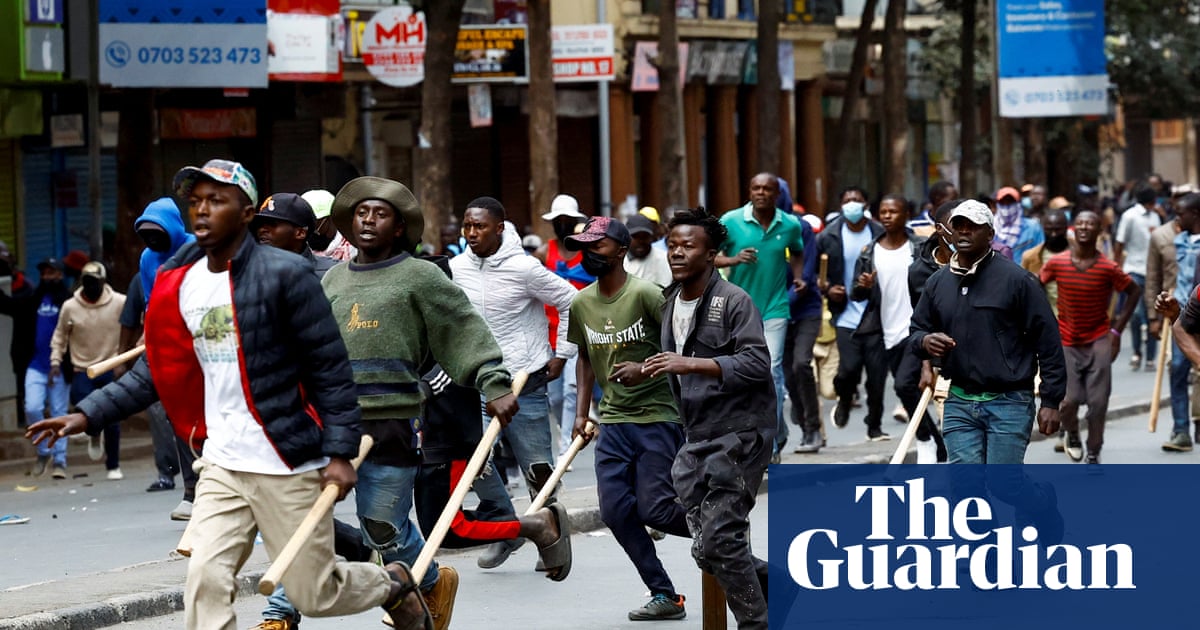Kenyans plan to march countrywide on Wednesday, the first anniversary of the historic storming of parliament by protesters, to honour those killed during last year’s anti-government protests, but there are fears that the march could escalate into unrest.
Rights activists, family members of killed and missing protesters, and young Kenyans, who were the main drivers of last year’s protests, have mobilised online and offline, with opposition leaders terming the day a “people’s public holiday” and the government warning against attempts to disrupt public order.
Last year’s demonstrations, in which 60 people died and many moredisappeared, were prompted by proposed tax increases. They started peacefully on 18 June but later turned chaotic after a violent police response, and people accused of being involved in the protests disappeared and were killed. The demands of the protests then widened to calls for reform and the resignation of the president, William Ruto.
In reaction, Rutoscrapped the finance billthat contained the proposed tax increases and restructured his cabinet to include opposition figures and create a “broad-based” government.
The street protests started declining from September, but killings,arrests,disappearancesand public resentment towards the authorities continued.
A recent series of demonstrations were triggered by the death of a teacher, Albert Ojwang, this month while he was being heldin police custodyafter reportedly criticising a senior police official on social media. Public anger erupted further as an officer shot a vendor, Boniface Kariuki, at close range during another round of protests last week.
In addition to concerns about police brutality, issues Kenyans protested about last year – including corruption, unemployment, government excesses and rising living costs – persist.
Mikhail Nyamweya, a political analyst, said the trust of many Kenyans – especially younger people – in the government remains low and they view the administration as “unresponsive and detached from everyday struggles”.
“Despite promises of reform, the Kenyan youth view the state as incapable of delivering and always quick to suppress dissent through coercive means,” he said. “Continued reports of human rights violations and inadequate accountability have reinforced the perception that little has changed.”
Wednesday’s plan includes peaceful processions in different parts of the country, and digital campaigns using hashtags. In Nairobi, people are expected to walk towards the parliament and the president’s office, laying flowers along the road and light candles outside the premises. Vigils were scheduled for Tuesday and Wednesday.
Recent demonstrations, including those over the death of Ojwang, have been infiltrated by men whom protesters have described as hired goons who disrupt protests by beating and robbing peaceful demonstrators.
Last week, Nairobi’s regional police commander, George Seda, called for calm from those who participate. “What I would like to urge the public is, let’s restrict ourselves to what we call ‘peaceful demonstrations’,” he said. “Let’s not have demonstrations that are going to interfere with other people who may not be part of the demonstrators.”
But some of Ruto’s allies and pro-government politicians have made threats against younger Kenyans. David Ndii, the chairperson of Ruto’s council of economic advisers,postedon X: “You allow yourself to be weaponised by self seekers, there’ll be casualties”, beforetelling a user: “Wewe tokea [You show up], and say your goodbyes before you leave home just in case you catch a stray.”
Rights activists have called for solidarity. “Let’s stand together as brothers and sisters tomorrow, united in solidarity,”said Hanifa Adan on X. “Let’s look out for one another and protect each other. May the Lord shield us from violence, political interference, and most of all, from the brutality of bloodthirsty police.”
Ina joint statement on Tuesday, envoys from 12 countries including the US and the UK stated its support for “every Kenyan’s right to peaceful assembly and to express themselves” and urged all parties “to facilitate peaceful demonstrations and to refrain from violence”.
The Kenya Conference of Catholic Bishops called for peaceful activities on Wednesday and criticised excessive use of force by police during demonstrations.
“A society that instils fear in its youth for simply speaking out is a society walking away from justice,” Nyeri archbishop Anthony Muheria said at a press conference. “The government’s primary responsibility is to protect its citizens, not to threaten, silence, or punish them.”
